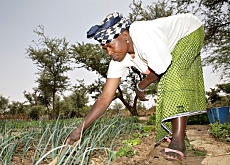Government “should spend more on aid”

Aid specialist Swissaid has called on the government to increase its spending on development projects abroad.
But to ensure that funding is well spent, the organisation said the authorities have to put pressure on corrupt governments that are sucking the lifeblood out of their populations.
Swissaid warned in Bern on Wednesday that the authorities would have to increase their budget for development aid over the next seven years to reach their promised target of 0.7 per cent of the gross domestic product by 2015.
The government has pledged to meet the percentage set out in the United Nations Millennium Development Goals. But NGOs have accused it of artificially boosting its aid figures by adding assistance to asylum seekers from developing countries in Switzerland.
Kicking off Swissaid’s annual funding campaign, director Caroline Morel said authorities could make a difference against famine in developing nations and would be better off not playing with figures.
With its campaign “Hunger is not a fatality”, the NGO wants to show that starvation takes place even in countries were food is available.
Swissaid president Simonetta Sommaruga was part of a parliamentary delegation that travelled to the African state of Niger in the past week to meet with local leaders and visit some of the organisation’s projects.
“There is enough food in the villages we visited, but prices are so high that people can’t afford to buy it,” she told swissinfo. “This is not the image we have of famine.”
According to Swissaid, part of the problem is corruption at the highest level of the state and the presence of international firms.
In addition, highly subsidised food from Europe and North America is imported, flooding local markets and discouraging farmers from production. With little or no local competition, prices go up and products become unaffordable.
Solutions
The non-governmental organisation says the solution is to support local projects encouraging the population to take up farming again.
In the villages where this support has been available, there is now enough food on the table and money in pockets thanks to revised agricultural practices.
“These villages need our support to help themselves,” said Sommaruga. “But the Swiss government, along with international organisations, also has to put pressure on the [Niger] government to ensure the population gets the food it has a right to.”
For Swissaid, the authorities must also be more coherent regarding foreign policy and consider their responsibilities beyond the border.
“When the government accepts export-risk guarantees for investments abroad, it should consider all the consequences of its actions,” Sommaruga said.
The Swiss authorities have been criticised recently for giving a guarantee to the firms working on Turkey’s controversial Ilisu dam despite the fact that local populations and historical sites are to be affected by the project.
But Sommaruga says plenty of work remains to be done before the government’s attitude changes. “We have to inform taxpayers and parliament that we must support the people in the villages, not corrupt governments, and that our aid is money well spent.”
swissinfo, Scott Capper
A group of eight Swiss parliamentarians visited Niger over the past week on a fact-finding mission.
The west African nation is one of the poorest countries in the world with minimal government services and insufficient funds to develop its resource base.
The largely agrarian and subsistence-based economy (90% of the population) is frequently disrupted by extended droughts common to the Sahel region.
More than 60 per cent of the population lives on less than $1 a day, and life expectancy hovers around 46 years.
Its natural resources include uranium, tin, coal and gold.
Swissaid is one of Switzerland’s biggest development aid organisations, founded in 1948.
It operates in nine countries in Asia (India, Myanmar), Latin America (Ecuador, Colombia, Nicaragua) and Africa (Guinea-Bissau, Niger, Tanzania, Chad), and lobbies in favour of development aid in Switzerland.
The organisation employs 80 people around the world.
It gives its support to 222 local projects and does not intervene with experts from developed nations.
Its revenue last year was SFr14.1 million ($11.37 million), including almost SFr8 million from pledges, donations and sales, as well as Sfr5.9 million from the Swiss Agency for Development and Cooperation.

In compliance with the JTI standards
More: SWI swissinfo.ch certified by the Journalism Trust Initiative











You can find an overview of ongoing debates with our journalists here . Please join us!
If you want to start a conversation about a topic raised in this article or want to report factual errors, email us at english@swissinfo.ch.